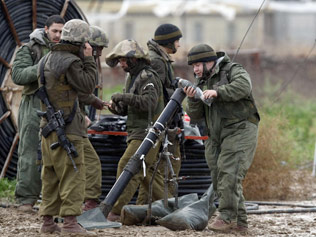
New front … thousands of Israeli troops have massed in preparation for a ground assault on Gaza.
ISRAEL has thousands of troops massed for a ground offensive on Gaza that would aim to deal a hammer blow to Hamas and re-establish Israel’s military credentials with its other foes, experts say.
The number of troops and tanks along the 60km border is a military secret but Israeli leaders say the force is ready and local media say the assault is imminent.
Israel launched air strikes and a naval bombardment one week ago in response to weeks of militant rocket fire from Hamas-run Gaza.
Israeli warplanes today hit Gaza targets including a mosque and a house where three young brothers were killed.
A missile from one of 30 new Israeli raids hit a house and killed the boys, aged from seven to 10, emergency services said.
At least 430 Palestinians have been killed – including top Hamas leader Nizar Rayan – and 2250 people wounded in the raids, according to Gaza officials. About 300 militant rockets have killed four people and wounded dozens in Israel.
After Israel’s 2006 war in Lebanon, widely condemned as a fiasco, this campaign has been scrupulously prepared and few experts believe Hamas can halt the waiting army.
Prime Minister Ehud Olmert has called it “iron fist” treatment.
Some analysts say Israel expects dozens of its soldiers to be killed in any ground offensive, but the government insists it wants to stop the rockets.
“Hamas must understand that if it launches rockets in the future it will have to pay a prohibitive price,” said Shabtai Shavit, a former head of the Mossad foreign intelligence service and now an adviser to the Israeli National Security Council.
“Israel does not intend to reconquer the Gaza Strip,” Mr Shavit said. Any ground campaign “would mean going in and inflicting additional damage and cost to Hamas.”
Asked whether this means killing more Hamas leaders or just destroying infrastructure, he said: “Everything.”
He predicted a war could last weeks with the ground offensive quickly followed by a phased withdrawal if a “political agreement” with Hamas could be concluded.
Uzi Dayan, a former deputy chief of Israel’s general staff and national security adviser to prime ministers Ehud Barak and Ariel Sharon, said the army must control areas of Gaza from which rockets are being launched and “put more pressure on the Hamas leadership and Hamas activists”.
He said the Israeli army would need to take control of key areas in Gaza, right up to the Egyptian border where a system of tunnels are used to smuggle weapons and other supplies into the territory.
Mr Dayan said that detaining Hamas leaders and activists will encourage ceasefire negotiations.
“You need some cards, it is not enough to just say ‘please stop the bombing’.”
Experts also said Israel wants to send a message to Iran, the Hezbollah militia in Lebanon and other enemies that after the disastrous 2006 war in Lebanon, the Middle East’s most powerful army is to be feared again.
The main lesson, according to Mr Shavit, Mr Dayan and several Israeli officers, is that an invading force cannot rely on the air force alone to beat an enemy. Israeli commanders were strongly criticised for waiting too long to send in ground troops in 2006.
“Our military has learned the lessons from the Lebanon campaign,” said Mr Shavit. “We need this campaign to re-establish the deterrent” after the failures of Lebanon.
Efraim Inbar, director of Bar-Ilan University’s Begin-Sadat Centre for Strategic Studies, agreed.
“The Israeli army needs to address the problem created to its deterrence in 2006,” he said.
“The army has to change its image among its enemies that it is afraid to use ground forces.
“There is no choice but to use ground forces. It does not necessarily need to be a large scale invasion, maybe just special units or localised incursions but the army needs boots on the ground.”
Israel will also be under pressure to make the campaign as short as possible, the experts said.
Prime Minister Olmert said this week that Israel was “not interested in conducting a long war”.
“Israel is much stronger than Hamas. We can continue the operation longer than Hamas can, but on the other hand we do not have all the time in the world,” said Mr Dayan.
He said international pressure will increase for a ceasefire and that domestic pressure will grow while hundreds of thousands of Israelis are in the line of fire of Hamas rockets.
By Tim Witcher in Jerusalem
January 03, 2009 12:33am
Source: Herald Sun